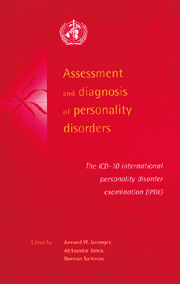 Assessment and Diagnosis of Personality Disorders
Assessment and Diagnosis of Personality Disorders Book contents
- Frontmatter
- Contents
- Contributors
- Preface
- Acknowledgements
- I Background and Field Trial
- Background
- Field Trial
- Sampling, interviewers, interview procedures
- Description of centres participating in the IPDE field trial
- Results
- Discussion and conclusions
- Appendix
- II International personality disorder examination (IPDE) ICD-10 module
- Index
Sampling, interviewers, interview procedures
from Field Trial
Published online by Cambridge University Press: 04 August 2010
- Frontmatter
- Contents
- Contributors
- Preface
- Acknowledgements
- I Background and Field Trial
- Background
- Field Trial
- Sampling, interviewers, interview procedures
- Description of centres participating in the IPDE field trial
- Results
- Discussion and conclusions
- Appendix
- II International personality disorder examination (IPDE) ICD-10 module
- Index
Summary
Method of sample selection
The subjects of the study were in-patients and out-patients enrolled in 14 participating mental health facilities located in 11 countries in North America, Europe, Africa, and Asia (Table 1). The sites were selected to provide a broad representation of different nations, languages, and cultures. An additional consideration was the availability of experienced investigators with an interest in personality disorders.
Each centre was asked to attempt to enter approximately 50 patients in the study. To adequately explore the diagnostic utility of the interview an effort was made at each site to attempt to include approximately 30 patients with a personality disorder and 20 patients with a common mental disorder that was important in the differential diagnosis of personality disorders (PDs). The goal was to have an approximately equal representation of patients of both sexes between the ages of 21 and 55. Sampling of consecutive admissions was not feasible, and cases were selected at the convenience of the investigators. All patients were screened by experienced psychiatrists or clinical psychologists according to the following criteria.
Exclusion criteria
Clinical evidence of toxic or organic brain disease.
Moderate to profound mental retardation.
Language or other communication difficulties preventing adequate assessment.
Alcohol- or drug-use likely to prevent an adequate examination.
Delusional disorders, acute transient, or other florid psychotic states.
Evidence that personality functioning may have been significantly changed by another psychiatric disorder, e.g., psychosis.
- Type
- Chapter
- Information
- Assessment and Diagnosis of Personality DisordersThe ICD-10 International Personality Disorder Examination (IPDE), pp. 58 - 60Publisher: Cambridge University PressPrint publication year: 1997


